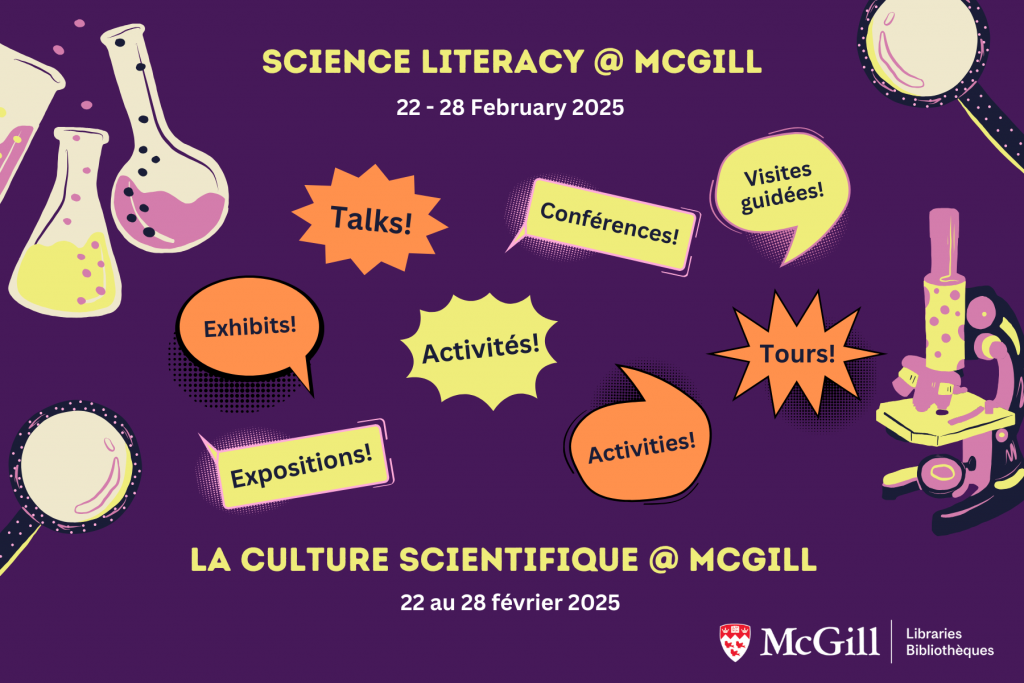
Science Literacy @ McGill Week is around the corner! From February 22 to 28, we will delve into this year’s theme, From Lab to Life and explore science in the everyday. There is a wide range of events planned including tours of the Maude Abbott Medical Museum and the McGill Physics Collections, a look into ancient Egyptian animal mummies from the Redpath Museum, Science History Treasures in McGill’s Rare Books and Special Collections, and much more. The details of the various events are listed below. We hope to see you there!
Selected works by Black scientists from McGill – the moth of February
- In honour of Black History Month, we are proud to highlight the works of Black scientists within the McGill community. From exploring structural racism in minority health research to fostering inclusion in scientific societies; from a poem about Canadian-Caribbean immigrants experiences to the effects of maternal mental health on child development, each work pushes the boundaries of knowledge within STEMM. As part of Science Literacy @ McGill, we invite you to join us in celebrating the remarkable achievements of Black scientists and the lasting influence of their work on society.
Citizen science: The story of DRAW (Data Rescue: Archives and Weather) – Monday, Feb 24th, 12:30 to 13:30
- Follow the journey from analogue McGill Observatory records to data sets and life on a web site.
What is inside the bundle? A study on the ancient Egyptian animal mummies from the Redpath Museum – Tuesday, Feb 25th, 10:30 to 11:30
- With Natalie Reznikov, Assistant Professor in the Department of Bio-engineering, whose research focusses on biomineralization — the study of structure-function relationships, formation and biomechanics of bone, teeth, eggshells, and mollusk shells.
Old books & new research: Uncovering the forgotten work of Mary Hinckley to answer new ecological questions (hybrid) – Tuesday, Feb 25th, 12:00 to 13:00
- Dr. Jessica Ford set out to determine what toad tadpoles were eating and how they impacted the environment, and in the process, came across unexpected results. Join us to hear about how old, obscure scientific papers can be vital in answering new research questions.
Tour of the Maude Abbott Medical Museum – Wednesday, Feb 26th, 14:30 to 15:30
- A fascinating repository of materials dating from the early 19th century that documents the study and practice of Medicine at McGill University and its associated teaching hospitals.
Tour the Rutherford Museum and McPherson Collection with Curator, Professor J. Barrette. – Thursday, Feb 27th, 12:30 to 13:30
- The Rutherford Museum contains a collection of the original apparatus used by Ernest Rutherford to investigate the newly-discovered phenomenon of radioactivity when he was Professor of Experimental Physics at McGill from 1898 till 1907. The McPherson Collection is comprised of antique physical instruments and apparatus dating from the mid-19th century to about 1920, many of them used in teaching and scientific research at McGill.
Science History Treasures in McGill’s Rare Books & Special Collections – Friday, Feb 28th, 13:00 to 16:00 drop in anytime
- From the earliest illustrated natural history encyclopedia to Isaac Newton’s annotated copy of Opticks, our collections span the evolution of biology, chemistry, mathematics, and physics. Join us for a rare chance to marvel at medieval manuscripts, early printed books, original artwork, and other highlights from our history of science collections.
VIRTUAL Tour of Schulich Library – Friday, Feb 28th, 12:30 to 13:30
- Housed in a 130-year-old building, the library has recently undergone a complete restoration that thoughtfully integrates historic charm with the latest technology, making it a true gem on our campus. Discover why the Schulich Library is a central hub for scientific learning and research in the University!
Visit the full list of Science Literacy @ McGill Week page for details and locations.
We hope to see you there!
